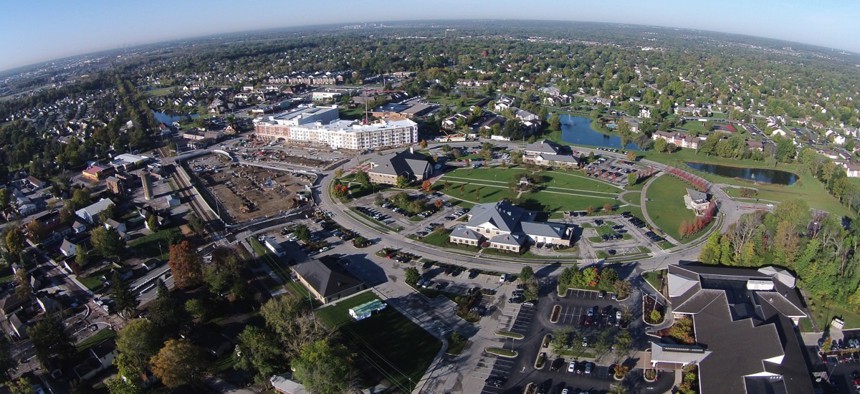3 Qualities Government Leaders Should Learn From Millennials

Fishers, Indiana (Photo submitted by the City of Fishers)

Connecting state and local government leaders
The mayor of Fishers, Indiana, thinks government has a lot to learn about pursuit of passion, risk-taking and staying connected from this oft-maligned generation.

FISHERS, Ind. — Millennials are generally described as lazy, entitled and narcissistic. Other than a propensity for creativity and inspired problem solving, my generation is often viewed as problematic.
As a mayor working in a government environment, it would be easy, perhaps expected, to make “safe” decisions—maintain the status quo. But millennial characteristics have served me well professionally, in a career progression from intern to mayor of Fishers, Ind. Fishers has benefitted by extension: it is one of the fastest-growing and entrepreneurial cities in the country.
These traits are familiar to fellow millennials, and I believe that they are effective in today’s business and municipal culture. As you look to advance your community, by either identifying and nurturing potential leaders or by becoming a leader yourself, consider millennial traits that serve government well:
Connected. My generation is known for being connected in social and technology contexts; “almost 90 percent of millennials say their phones never leave their sides,” according to USA Today. But the concept of connection, being linked to a person, thing or idea, is an intangible quality that helps leaders understand complex issues and how so much of our world is interrelated today.
Seeking connections and staying in communication helps us understand who and how to lead. For example, connections within the community, particularly the Fishers Police Department, led to the creation of the Fishers Mental Health Task Force, an active network and action plan for mental health crises treatment. Had information remained siloed, we may not have seen an opportunity to help in such a comprehensive way.
Need for purpose. Millennials are criticized for not accepting the way things have always been done. Employers may struggle to engage younger employees, and job performance may not meet expectations in antiquated corporate environments—unless employees feel a sense of purpose. Millennials are motivated by meaningful work, companies they believe in. Passion and purpose are the new collective values. We have a strong desire to be a part of something bigger than ourselves.
As leaders it is our job to bring our best to those we serve. Working from a place of passion is how we are able to do our best work, contribute and help others. We’re more inspired when work has personal meaning, and that spark carries over to our team, customers, partners, and constituents.
Helping others is a motivator for me; I pursued a path to become town manager, because the role allowed me to help in an immediate way. I love what I do, but some question how I get it all done? The answer is: I don’t. My job is like a sprint, I run as fast as I can, as hard as I can, for as long as possible. I don’t know where the finish line lies and I am not certain I ever want to find it. I enjoy running far too much because the effort is grounded in a deep sense of purpose. Knowing at the end of the day that I did the best I could to serve my community gives my job a sense of purpose.

Risk taking. Millennials celebrate entrepreneurism but aren’t creating new businesses in pace with previous generations. In this context, millennials aren’t considered strong risk takers. But we are fearless brainstormers of creative ideas and solutions. To some, out-of-the-box thinking is a risk.
Fishers took an untraditional approach to economic development. Instead of focusing on manufacturing and relocating whole companies, we provided incentives to attract and develop entrepreneurs and emerging businesses. We created an incubator/co-working space called Launch Fishers to support entrepreneurs just starting out, and master leases to support Launch Fishers alumni looking for their first office space. By developing Fishers from a bedroom community—where residents lived but didn’t work—to an entrepreneurial city—a desirable place to live and work—we created a more vibrant community.
Many things could go wrong by making an “unsafe” decision. But taking a risk could yield positive returns far greater than imagined. As leaders, this is our moment to really operate from a place of vision: what is the best solution? What is the best route? Even with shareholders and stakeholders to answer to, sometimes we have to take aggressive action and trust.
To some, risk taking is too much of a gamble. Millennials feel invigorated by potential opportunities, moved by a sense of purpose and confident in our connections. Great things are possible—especially when you take a leap.
Scott Fadness is the Mayor of Fishers, Indiana and became that city’s first mayor in 2014 after serving as Fisher’s town manager and deputy town manager for operations.

NEXT STORY: Free, high-speed Wi-Fi hotspots launch in NYC




